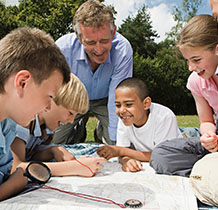Resource Database

Click on a topic or use the search box below to look for a listing:
There are 488 resources. Displaying 10 resources per page.
Published by Boston Afterschool & Beyond, this practice brief includes recommendations from the organization’s pilot using digital badges to promote SEL skills among students. During this pilot program, staff focused on five key skill areas: communication, engagement in learning, perseverance, problem solving, and teamwork-all skills that are necessary for success in school, college, and future careers.
View Resource
For 20 years the PBS award-winning series Arthur has been a favorite of children across the United States. The producers of Arthur recently launched Arthur Interactive Media (AIM) Buddy Project, a new initiative aimed at helping young children build their social, emotional, and character skills and attitudes through the use of new digital tools. Learn more about the initiative from this webinar recording hosted by the Afterschool Alliance (free registration required).
View Resource
Anticipating a student’s response to new and different situations is critical to creating a safe learning environment. ExtendED Notes presents three easy ways for any program to establish a safe learning environment. Ensuring that children feel safe and secure allows students to focus on their learning and curiosity in the moment.
View Resource
Presented by American Youth Policy Forum, this brief shares key takeaways from a recent forum in which leaders and researchers in the field of SEL (social-emotional learning) practice, youth engagement, and school climate discussed ESSA’s non-academic indicators of student achievement and their inclusion in state accountability systems. An overview of the forum is also available on the American Youth Policy Forum website.
View Resource
Studies have proven that children’s academic and cognitive performance improves when students are active. This blog post from the Alliance for a Healthier Generation describes the October 5 “Walk to School Day,” and provides four tips to help schools make every day a walk to school day. Learn how schools across the country are making health a priority by integrating walking into everyday activities.
View Resource
Diverse Learners
Hosted by the U.S. Department of Education’s You for Youth 21st CCLC web portal, this webinar recording highlights tools and strategies that afterschool program leaders can use to support and coach grantees to design and implement programs with intentionality and fidelity.
View Resource
Program Management
When staff bring diverse backgrounds and experiences to a program, how can afterschool leaders ensure they all have a basic understanding of how to engage youth in learning, such as in STEM (science, technology, engineering, and mathematics) activities? Positive youth development (PYD) is a pro-social approach to child development that supports youth in fostering positive relationships. This article from the National Afterschool Association explains how staff can benefit from a shared knowledge of PYD and its impact on engaging students in STEM activities. The article also links to additional resources on PYD and STEM professional development.
View Resource
Program Management
Developing and maintaining a data system is one way afterschool programs can ensure they provide high-quality programming. This research brief shares findings from a study commissioned by the Wallace Foundation on the interplay between technology, processes, and people. Findings from the initial two years of research focus on how programs in nine cities developed their capacity to use data to strengthen their afterschool programs.
View Resource
Program Management
The federal 21st CCLC program provides key funding for afterschool programs. When other sources of funding become necessary, do you know where to look to augment your 21st CCLC grant? This blog post by American Youth Policy Forum provides a list of ways providers may wish to seek additional funding for programming. In using this list as a guide, 21st CCLC grantees will want to make sure that they are supplementing, and not supplanting, programming. Contact your ISBE grant consultant to ensure any additional funds procured are used within the boundaries of your grant.
View Resource
Sustainability
The Campaign for Grade-Level Reading focuses on an important predictor of school success and high school graduation: grade-level reading by the end of third grade. This collaborative effort by nonprofit, business, government, and community partners strives to ensure more children in low-income families are prepared for college, career, and active citizenship. The Campaign’s website offers recommendations and resources to help mobilize communities to remove barriers, expand opportunities, and assist parents to become full partners in their children's success.
View Resource
There are 488 resources. Displaying 10 items per page.
- Academic Enrichment
- Afterschool Enrichment
- Classroom Management
- College and Career Readiness
- Diverse Learners
- Family and Community Engagement
- Program Management
- Social-Emotional Learning
- Sustainability
- Technology
Subscribe to the Illinois Quality Afterschool newsletter and resource bulletin.
